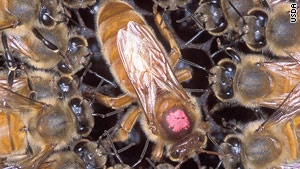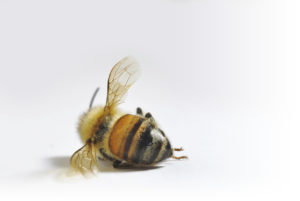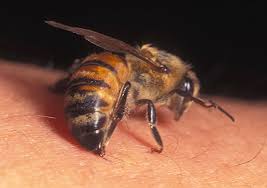I do not have a green thumb. (I’d say I had more of a brown thumb, but that doesn’t sound quite right.) Anyway, I just can’t grow anything in my garden. My wife has better success, but really works at it, too. The other morning, I went outside and observed my wife inserting a tiny paintbrush into an equally tiny flower on one of the garden plants. While eccentric behavior is the norm in our household, I had to ask why she was tickling our tomatoes while in her bathrobe.
“I’m pollinating your garden,” she replied without looking up.
Now while pollen and I do not get along in most cases, I did remember that it was a necessary evil in the plant world. I just didn’t remember this requirement being covered on the seed packet.
“I need to transfer the pollen or we won’t get any tomatoes,” she added.
I remembered that part. Even plants have mommy and daddy “stuff” that needs to get together to produce fruit. My high school trick for remembering the male plant part, the stamen (as in stamina!), has served me well over the years. I just never could remember that female part name…
As she moved, bent over, from plant to plant, I suddenly became concerned that our neighbors may be watching, or worse, listening and watching.
“Why are you now doing this?” I asked.
“No bees.”
Yes, bees make honey. But they do much of that small, but critical, pollination task that keeps our garden full of great-tasting food and my wife inside the house making it for me. And we seem to have plenty of flowers open and waiting. But, “No bees?”
One of our friends is a beekeeper. She’s a nice lady. Marginally insane for doing what she does, but she loves it and offers top-notch honey. She has continued to express concerns about both the inevitable Africanization of her hives and the potential for Colony Collapse Disorder (CCD). CCD happens when most of the workers just disappear, leaving the queen and a few subjects to fend for themselves – not a good thing.

On our beekeeping friend’s good advice, we have drastically reduced our own pesticide use around our house. I find that swatting or stepping on unwanteds is the most environmentally friendly method of pest control, but I will supplement with diatomaceous earth as needed. All unwanted flyers that can make it past my rolled-up magazine get a temporary pass. But bees are definitely wanted around our house.
So, what gives?
A quick trip visit to my search engine gave me some clues to ponder.
Bee colonies are subject to stresses from multiple directions, and recently science has discovered some potential new culprits. Advance Science reports that Nosema is a type of fungus that attacks the honey bee’s gut. (Yuk!) It is one of the major threats to honey bee populations around the world. One strain, Nosema ceranae (NC), was only discovered in 2004 and tends to build up in the hives over years. And, although there is no confirmed evidence that NC is the cause of CCD, it seems to almost always be present in hives suffering from CCD and also serves to weaken the bee’s immune system and reduce overall population. Bees also need to consume 50% more food when they have NC.(1)
Maybe I’m wrong, but this didn’t sound good. I had a vision of a voracious tapeworm clamping onto my innards as I tried to focus on my chores. I might run away, too.
A 2014 article in the Journal of Experimental Biology looked at the effects of field-realistic doses of glyphosate (“GLY”) on honeybee appetitive behavior. The researchers “speculate that successful forager bees could become a source of constant inflow of nectar with GLY traces that could then be distributed among nest mates, stored in the hive and have long term negative consequences on colony performance.” In addition, their “results show that both chronic and acute exposure to GLY traces produces sensory sensitivity and cognitive deficits on adult honeybees of the worker caste.” (2)
Wait. Glyphosate (GLY) is the active ingredient in my weed-killing buddy, Roundup. That’s an herbicide, not a pesticide, so it shouldn’t impact our bee friends, right? And I’m smart enough that I do not spray my edibles with Roundup. (Although I always suspect a jealous neighbor might plot such an attack.)
In 2013, Dr. Don Huber submitted a paper to the Center for Honeybee Research asking: Is glyphosate a contributing cause of bee colony collapse disorder (CCD)? He states that “Glyphosate is a strong antibiotic” that suppresses beneficial bacteria that suppress the bad bacteria. (We all need the good guys to keep the bad guys under control. My doctor tells me to eat yogurt and take probiotics while I’m on antibiotics to keep things in my gut “balanced.” That’s the polite wording.) Dr. Huber also quotes research that indicates “various fungal pathogens are especially increased in activity and virulence by glyphosate.” (There’s that fungus word again. And I thought GLY was just a weed killer) And Dr. Huber states, “Minerals in glyphosate-tolerant plants may be impacted even more by glyphosate than those in non-tolerant plants since there is nothing in the genetic engineering that does anything to nullify the glyphosate and its chelating effect on mineral nutrients. Since plant products are the source of essential mineral nutrients, bees may become mineral deficient, malnourished, have a weakened immune system, and be more susceptible to infections and abiotic (environmental) stresses.”(3) (“May” is certainly the operative word here, but I’d rather the overall message was a bit more, shall we say, positive.)

Given that bees are working their way through our forests and fields, it makes sense that they would be exposed to pesticides that might do them in. But as we spray more and more chemicals, and also get wind-blown drifting onto innocent plants, their flowers, and their water sources, are we hurting our beloved, hard-working bees? And, do we really know the long-term effects of our current actions?
And, is this information important to my own gut health? It seems there are still plenty of questions to be asked and answered on this subject. And, as a person who just “likes to know,” I’m a bit impatient to find out.

